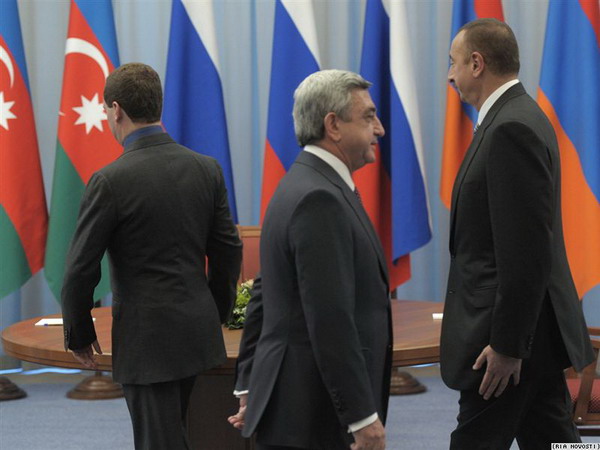Mediators are getting prepared for the next Sargsyan-Aliyev meeting
On October 27, the meeting of the presidents of Armenia and Azerbaijan initiated by the French side is planned on October 27, in Paris. A few days ago, Ambassador Extraordinary and Plenipotentiary of France to Armenia, Henri Reynaud, confirming this earlier published information on the media, added that France is seeking for the peaceful settlement of the Karabakh conflict. “The parties should decide themselves on how the agreement should be. Mediators assist them, but they cannot decide instead of them.”
At a briefing with journalists on October 15, Azerbaijani Foreign Minister Elmar Mammadyarov said that Azerbaijan expects major shift from the tripartite meeting of presidents planned in Paris. He mentioned that Azerbaijan is for “intensive preparations” of the great peace treaty for Nagorno-Karabakh conflict settlement. Later, Mammadyarov informed that the OSCE Minsk Group co-chairs have made a couple of questions involving recommendations. “We came to the decision that we can pass to drafting the peace agreement based on structural recommendations, which also include liberation of the lands and the return of refugees. We are fully prepared to a new stage and expect a similar move from Armenia, too,” announced Azerbaijani Foreign Minister, according to agencies of Azerbaijan, adding, “Azerbaijan is ready to start such negotiations on the level of experts.”
Read also
OSCE Minsk Group co-chairs are in the region since October 15. To what extent Mammadyarov’s statement are accurate with regard to the recommendations made by the co-chairs, perhaps it will be clear to them after the visit to Armenia. Pertaining to the “great peace treaty”, the official Baku is speaking not for the first time. At times, Azerbaijan government officials voice that they are ready for drafting the “great peace treaty”, whereas it is obvious that they just are not ready for any concessions, even respecting the agreements reached during the on-going negotiations. While the preparation of Sargsyan-Aliyev meeting is underway, the issue of installation of the customs checkpoint between Armenia and Nagorno-Karabakh remains open after Armenia’s accession to the Eurasian Union.
First, everything started with the statement of the President of Kazakhstan months ago, when in the Astana summit, he voiced Aliyev’s letter addressed to the EaEU member countries leaders. Now, Nazarbayev himself made it clear that everything is settled. Official Yerevan is trying to put an end to this issue.
Recently, by “R-Evolution” TV broadcast, the deputy FM of Armenia, Shavarsh Kocharyan, emphasized that the issue of installing a customs checkpoint has not been a subject of negotiations. “Moreover, there is nothing about it in the agreement. I am surprised at when there are analysis saying that such a thing is derived from the agreement. It just states a very logical formulation that the customs territory is their territory. In other words, the customs territory falls under the territory of the state. This is what is fixed, and it applies to all member states. The Republic of Armenia, naturally, could not accept a selective approach to itself to have a tougher statement. They do not have it.”
But with regard to the remark made by Nazarbayev recently, Sh. Kocharyan mentioned, “The problem is as follows. The matter here is not about mutual concession. We have just reconfirmed the approach that Armenia had initially, since the days of independence. This means that Karabakh is not a part of Armenia. We have built our relations with Karabakh as a de facto established state, recognizing de jure, and our relations are horizontal.” The Minister of Economy of Armenia, Karen Chshmarityan, in his turn, stated that there is no clause in the agreement of Armenia’s accession to the EaEU saying about installation of the customs checkpoint between Armenia and Karabakh, and that in all agreements of Armenia it reads, “RA borders”. Meanwhile, Russian experts continue voicing views that there will be customs checkpoints.
Russian expert, also former editor-in-chief of the “Regnum” agency, also currently editor-in-chief of the REX news agency, Modest Kolerov, for example, believes that there will be customs checkpoints between Armenia and Nagorno-Karabakh. “Also, there will be a Customs Service representative on already existing border between Armenia and Karabakh.” He, however, added that it is also obvious that the Karabakh production, today, comes out to the European market under the name of the Armenian product, and so it will continue. “If the product reads that it is made in Armenia, no problem will arise.” In the interview with 1in.am, the Russian political scientist, also publicist, also Russian President Vladimir Putin’s opponent Andrey Piontkovsky also expressed an opinion that a customs checkpoint will be installed between Armenia and Nagorno-Karabakh.
“Formally, it will be installed, perhaps, the custom rules will not function there, but it will be formally installed. This is going to have a political importance rather than economic. Kazakhstan and Belarus would not go for exclusion of the customs checkpoint. They cannot subordinate their relations with Azerbaijan. Whereas Russia is playing a double game in the South Caucasus, so it is also advantageous to Russia.”
As to which allegations on existence or non-existence of the customs checkpoint are close to reality, time will tell. However, it should also be noted that in those days, there were also publications in the Russian press that Moscow seeks to smooth the relations with Azerbaijan after Armenia’s accession to the EaEU, therefore, Russia’s Defense Minister Sergei Shoygu left for Baku. Such information was reported by “Kommersant”, the military source standing close to the Kremlin. The military and technical cooperation between Russia and Azerbaijan gaining a new impetus, as well as some information that in 5 years Azerbaijan will receive from Russia another 5 billion dollars arm, as to why it should be considered an equivalent “comfort” in terms of easing down Azerbaijan, to put it mildly, is not clear.
Emma GABRIELYAN



























































